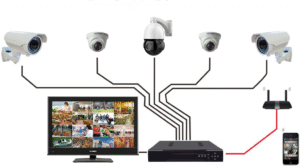A Digital Video Recorder (DVR) is a core component of traditional CCTV systems. It receives analog video signals from coaxial-based security cameras, converts the footage into digital format, and stores it locally on a built-in hard drive. DVRs remain a popular choice for small businesses and homes looking for reliable, budget-friendly surveillance.
Although DVRs and NVRs (Network Video Recorders) both store security footage, they differ significantly in:
✔ Camera compatibility
✔ Video processing method
✔ Cable type
✔ Future scalability
🎥 How DVR Security Systems Work
DVR systems operate on closed-circuit technology (traditional CCTV):
| DVR Feature | Description |
|---|---|
| Camera connections | Uses coaxial cables (BNC) for each camera |
| Supported cameras | Analog cameras or HD-over-Coax (TVI, CVI, AHD) |
| Video processing | Encoding is done inside the DVR |
| Storage | Local hard drive — no internet required |
| Network dependency | Optional — can function offline |
| Accessibility | On-premises access required unless connected to a network |
This makes DVRs ideal for secure environments where internet dependence is a risk.
⭐ Benefits of DVR Surveillance Systems
DVRs continue to deliver strong value for business and home users. Here’s why:
✔ Cost-Effective Security
DVRs are typically more affordable than NVR or cloud-based solutions — perfect for small facilities like:
Retail stores
Warehouses
Offices
Job sites
Residential buildings
✔ Internet Not Required
Video recording continues even during network outages, providing:
📌 Local security
📌 No cyber-intrusion risk through internet
📌 Reliable 24/7 recording
✔ Immediate On-Site Access
Security operators can view and export footage directly from the recorder without remote system dependency.
✔ Compatible With Existing Analog Infrastructure
If you already have coaxial cabling, DVRs allow easy upgrades without rewiring the entire property.
⚠ Challenges of DVR Camera Systems
Before choosing a DVR solution, consider the limitations:
| Challenge | Why It Matters |
|---|---|
| More cables required | Separate cables for power + video |
| Lower max image resolution | Compared to IP 4K and AI cameras |
| Limited remote access | Requires network integration |
| On-site maintenance & storage | Hard drives must be monitored and replaced |
| Less flexible installation | Cameras must be physically wired back to DVR |
🔄 DVR vs. NVR — What’s the Difference?
| Feature | DVR | NVR |
|---|---|---|
| Camera Type | Analog / HD-over-Coax | IP Network Cameras |
| Cabling | Coaxial (BNC) | Ethernet (PoE) |
| Video Processing | At the DVR | At the camera |
| Resolution | Limited (Up to 1080p–4MP typically) | Up to 4K/8MP+ |
| Smart Features | Minimal | AI detection, analytics, alerts |
| Scalability | Limited | Highly scalable |
👁️ Who Should Choose DVR Security?
DVR-based CCTV is ideal for:
✔ Small businesses and small homes
✔ Locations with no internet access
✔ Facilities already using coax cabling
✔ Tight security budgets needing reliable monitoring
🚀 DVR Alternatives for the Future
As security technology advances, businesses increasingly shift toward:
NVR IP camera systems
Hybrid cloud video solutions
AI-enhanced smart surveillance
Remote monitoring & mobile alerts
These options provide improved:
📌 Video quality
📌 Storage scalability
📌 Security analytics
📌 Real-time notifications
📌 Multi-site access
🏆 Secure It Global: Your Trusted Video Surveillance Partner
Choosing the right recording system is crucial to protecting your property.
At Secure It Global, we provide:
✔ System design tailored to your building
✔ Professional DVR/NVR installation
✔ Coax-to-IP upgrade planning
✔ Equipment from trusted brands like Uniview, Hanwha Vision & Dahua
✔ Ongoing technical support
📞 Contact today to find the best surveillance recording solution for your business or home.
Secure IT Global LLC
167 Madison Ave
New York, NY 10016
(888) 902 2303








